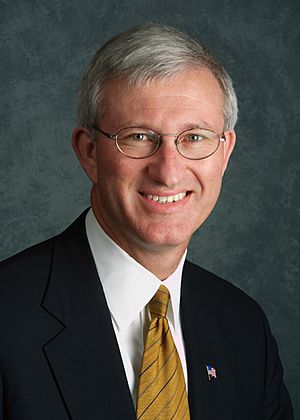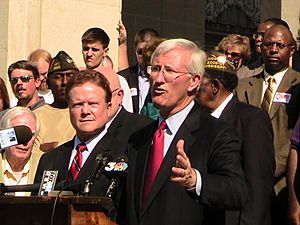Ronnie Musgrove facts for kids
Quick facts for kids
Ronnie Musgrove
|
|
|---|---|
 |
|
| 62nd Governor of Mississippi | |
| In office January 11, 2000 – January 13, 2004 |
|
| Lieutenant | Amy Tuck |
| Preceded by | Kirk Fordice |
| Succeeded by | Haley Barbour |
| 29th Lieutenant Governor of Mississippi | |
| In office January 4, 1996 – January 11, 2000 |
|
| Governor | Kirk Fordice |
| Preceded by | Eddie Briggs |
| Succeeded by | Amy Tuck |
| Member of the Mississippi State Senate from the 10th district |
|
| In office January 5, 1988 – January 2, 1996 |
|
| Preceded by | Charles Ray Nix |
| Succeeded by | Nolan Mettetal |
| Personal details | |
| Born |
David Ronald Musgrove
July 29, 1956 Sardis, Mississippi, U.S. |
| Political party | Democratic |
| Spouses |
Melanie Ballard
(m. 1977; div. 2001)Melody Bounds
(m. 2007; died 2021) |
| Children | 4 |
| Education | Northwest Mississippi Community College University of Mississippi (BA, JD) |
David Ronald Musgrove (born July 29, 1956), also known as Ronnie Musgrove, is an American lawyer and politician. He served as the 62nd governor of Mississippi from 2000 to 2004. A governor is the leader of a state's government. As a member of the Democratic Party, he was known for being a conservative leader.
Before becoming governor, Musgrove was the lieutenant governor of Mississippi from 1996 to 2000. In 2008, he ran for a seat in the United States Senate but lost to the person already holding the job, Roger Wicker.
After his time in politics, Musgrove returned to working as a lawyer. In 2014, he helped start a new law firm in Jackson, Mississippi. As of 2025, he is the last Democrat to have been the Governor of Mississippi.
Contents
Early Life and Education
David Ronald "Ronnie" Musgrove was born on July 29, 1956, in Sardis, Mississippi. He grew up in the small communities of Tocowa and Batesville. He had four brothers and sisters. His mother worked in a textile factory, and his father worked on a road crew for the state.
When Musgrove was seven years old, his father died from pneumonia. After high school, Musgrove went to Northwest Mississippi Junior College. He later earned degrees from the University of Mississippi and its law school.
Political Career
Musgrove began his career in politics by serving in the state government. He held several important jobs before becoming governor.
Mississippi State Senator
In 1987, Musgrove was elected to the Mississippi State Senate, where he represented Panola and Tate counties. The State Senate is a part of the government that helps create laws for the state. During his time as a senator, he focused on improving schools and colleges. He was reelected in 1991 and became the chairman of the Education Committee.
Lieutenant Governor
In 1995, Musgrove ran for lieutenant governor of Mississippi and won. The lieutenant governor is the second-highest official in the state government. He worked with Governor Kirk Fordice.
While he was lieutenant governor, Governor Fordice was seriously injured in a car accident. Musgrove had to step in as acting governor from November 7 to December 17, 1996. He handled the state's daily business until the governor recovered.
Musgrove and Governor Fordice sometimes disagreed, especially about funding for public schools. Musgrove worked hard to pass the Mississippi Adequate Education Act, a law to give schools more money, even when the governor was against it.
Governor of Mississippi
In 1999, Musgrove decided to run for governor, the highest office in the state.
The 1999 Election
The election for governor in 1999 was very close. Musgrove ran against Republican Mike Parker. Musgrove focused his campaign on improving education. He traveled all over the state to meet voters and share his ideas.
When the votes were counted, Musgrove had more votes than Parker, but he did not have a majority (more than half of all votes). According to Mississippi's constitution at the time, if no one got a majority, the Mississippi House of Representatives had to choose the winner. On January 4, 2000, the House voted for Musgrove, and he officially became the governor. This was the only time in Mississippi's history that the House of Representatives decided who would be governor.
Time in Office
Musgrove was sworn in as governor on January 11, 2000. As governor, he continued to focus on making schools better and creating jobs.
Jobs and the Economy
Governor Musgrove started a program called the Advantage Mississippi Initiative (AMI). This plan helped bring new businesses to the state. One of the biggest successes was convincing the car company Nissan to build a new factory in Mississippi. This project created thousands of jobs and helped the state's economy grow.
Education and Healthcare
Musgrove was often called the "education governor." He signed a law that gave teachers the largest pay raise in the state's history. During his time as governor, Mississippi's school standards improved greatly. By 2002, every classroom in the state had a computer with internet access.
He also worked to improve healthcare for children. He expanded a program that provides health insurance to children from low-income families. When he started, fewer than 525 children were in the program. By the time he left office, over 60,000 children were covered.
The Mississippi State Flag
In 2000, there was a debate about Mississippi's state flag, which included the Confederate Battle Flag. Many people found the flag offensive. A court ruled that the flag was not technically official.
Governor Musgrove created a special group to study the issue and suggest a new design. The new design was put to a vote in a special election in 2001. However, the people of Mississippi voted to keep the old flag.
2003 Reelection Campaign
In 2003, Musgrove ran for a second term as governor. He faced Republican challenger Haley Barbour. This time, Musgrove lost the election.
Life After Politics

After leaving the governor's office, Musgrove returned to his work as a lawyer.
In 2008, he ran for the United States Senate. The U.S. Senate is part of the national government in Washington, D.C. He campaigned across the state but lost the election to Roger Wicker.
Since then, Musgrove has stayed involved in public service. He works with groups that support better education and healthcare, especially for families in rural areas. He also started a consulting firm and teaches classes at the University of Mississippi and Mississippi College School of Law.
Personal Life
Musgrove married Melanie Ballard in 1977, and they had two children. They divorced in 2001. In 2007, he married Dr. Melody Bounds. She passed away from leukemia in 2021. Musgrove has a total of four children.
 | James Van Der Zee |
 | Alma Thomas |
 | Ellis Wilson |
 | Margaret Taylor-Burroughs |

